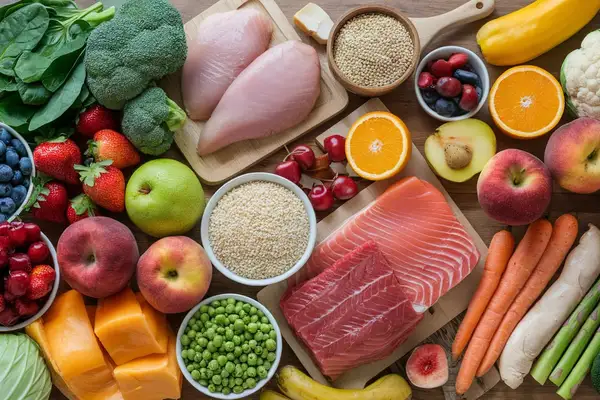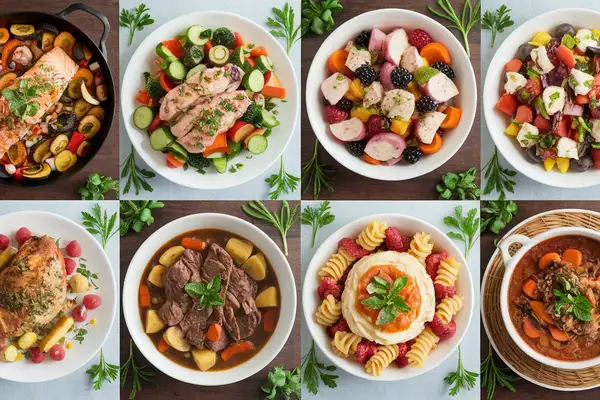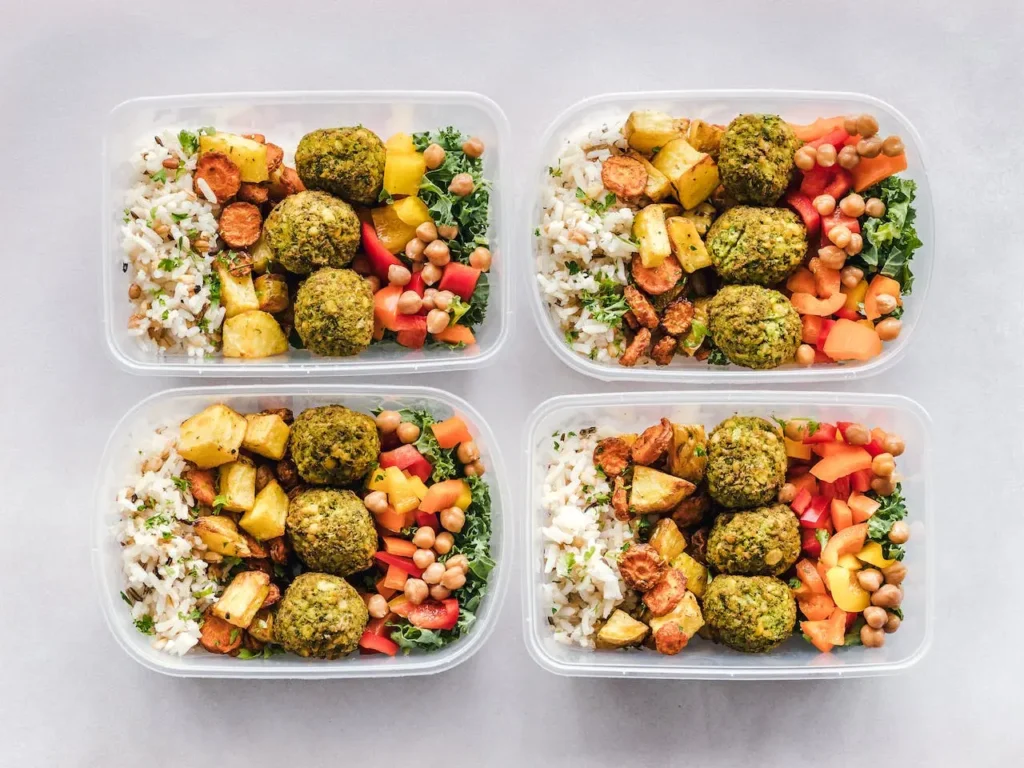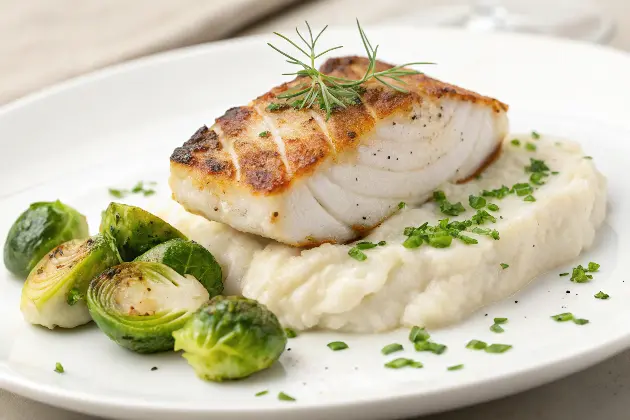Free 7-Day Keto Diet Plan With Complete Food List
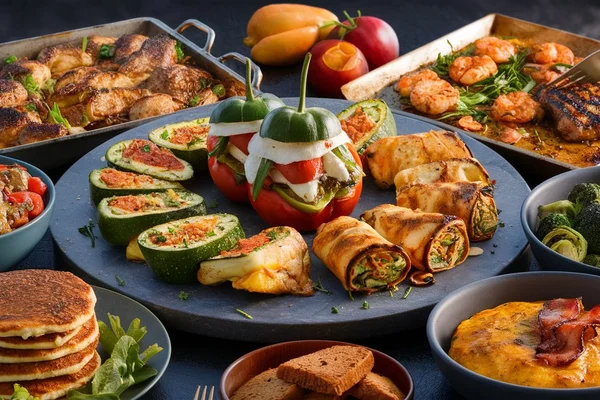
This post may contain affiliate links, meaning I may earn a commission if you make a purchase, at no extra cost to you. I only recommend products I trust. Thank you for your support.
The ketogenic diet, commonly known as the keto diet, has gained immense popularity for its potential to help people lose weight and improve overall health.
This low-carb, high-fat diet forces your body to enter a state of ketosis, where it burns fat for fuel instead of carbohydrates.
For those new to the keto diet, this article provides a comprehensive 7-day keto diet plan, including a detailed keto food list, and a variety of keto recipes to get you started on your ketogenic journey.
What is the Ketogenic Diet?
The ketogenic diet is a high-fat, low-carbohydrate eating plan that aims to put your body into a metabolic state called ketosis.
In ketosis, your body becomes highly efficient at burning fat for energy. This diet typically includes around 70-75% of calories from fat, 20-25% from protein, and 5-10% from carbohydrates.
7-Day Keto Diet Plan (Keto Menu Plan)
This keto diet meal plan includes a variety of friendly keto recipes to choose from and is suitable for beginners and advanced dieters, providing approximately 1500-1800 calories per day with a macronutrient ratio of about 75% fat, 20% protein, and 5% carbohydrates.
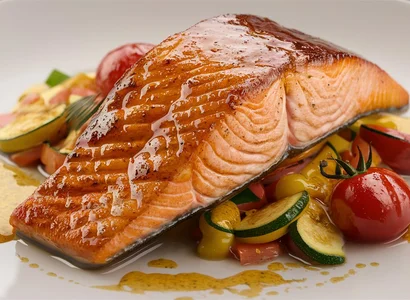
Day 1
Breakfast:
- Scrambled Eggs with Bacon: Scramble eggs in butter and serve with crispy bacon. (2 eggs, 1 tbsp butter, 2 slices bacon)
Lunch:
- Chicken Caesar Salad: Grill chicken breast and serve over romaine lettuce with Caesar dressing and Parmesan cheese. (4 oz chicken breast, 2 cups romaine, 2 tbsp Caesar dressing, 1 oz Parmesan, 1 tbsp olive oil)
- Garlic Butter Steak Bites with Green Beans: Sauté steak bites with green beans in garlic butter. (8 oz steak, 1 cup green beans, 2 tbsp butter, 1 tsp garlic powder, salt, pepper)
Dinner:
- Pan-Seared Salmon: Cook salmon fillet in coconut oil, serve with roasted broccoli and hollandaise sauce. (5 oz salmon, 1 tbsp coconut oil, 1 cup broccoli, 2 tbsp hollandaise sauce)
- Tuna Salad Lettuce Wraps: Mix tuna with mayo and wrap in lettuce leaves. (1 can tuna, 2 tbsp mayo, lettuce leaves, salt, pepper)
Snack:
- Nuts and Cheese: Enjoy a mix of almonds and cheddar cheese. (1 oz almonds, 1 oz cheddar cheese)
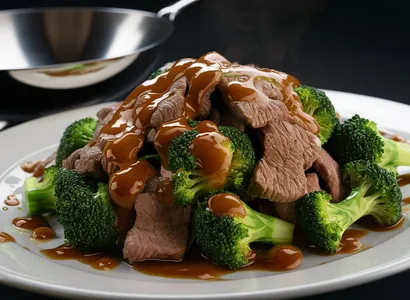
Day 2
Breakfast:
- Cacio E Pepe Egg Noodles: Mix egg noodles with cheese and pepper. (2 eggs, 1/4 cup Parmesan, black pepper)
Lunch:
- Tuna Salad Stuffed Avocado: Mix tuna with mayo and celery, stuff into a whole avocado. (1 avocado, 4 oz canned tuna, 2 tbsp mayonnaise, 1 tbsp chopped celery)
- Beef and Broccoli Stir-Fry: Stir-fry beef and broccoli with soy sauce. (8 oz beef, 2 cups broccoli, 2 tbsp soy sauce, 1 tbsp olive oil, salt, pepper)
Dinner:
- Beef Burger with Cauliflower Rice: Cook a beef patty, top with cheese, and serve with buttered cauliflower rice and mixed greens. (6 oz ground beef, 1 slice cheddar, 1 cup cauliflower rice, 1 tbsp butter, 1 cup mixed greens, 1 tbsp olive oil dressing)
- Prosciutto and Cheese Roll-Ups: Roll prosciutto with cheese. (4 slices prosciutto, 4 slices cheese)
Snack:
- Hard-Boiled Eggs and Nuts: Enjoy hard-boiled eggs with macadamia nuts. (2 eggs, 1 oz macadamia nuts)
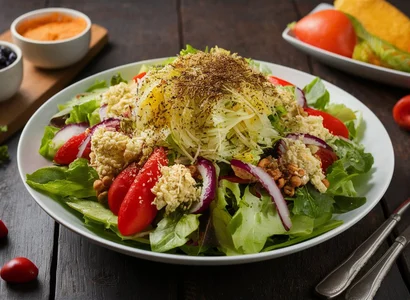
Day 3
Breakfast:
- Cheese Omelet with Bacon: Make a cheese omelet with bell peppers and serve with bacon. (3 eggs, 1 oz cheddar, 1/4 cup bell peppers, 2 tbsp heavy cream, 2 slices bacon)
Lunch:
- Keto Cobb Salad: Combine mixed greens, grilled chicken, egg, blue cheese, bacon bits, and avocado with ranch dressing. (3 cups mixed greens, 3 oz chicken breast, 1 egg, 1 oz blue cheese, 2 tbsp bacon bits, 1/4 avocado, 2 tbsp ranch dressing)
- Zucchini Bun Hot Dogs: Use zucchini slices as hot dog buns. (2 hot dogs, 1 zucchini, mustard)
Dinner:
- Pan-Seared Pork Chop: Cook pork chop in olive oil, serve with zucchini noodles and sour cream. (5 oz pork chop, 1 tbsp olive oil, 1 cup zucchini noodles, 1 tbsp butter, 2 tbsp sour cream)
- Cheeseburger Cabbage Wraps: Wrap cooked burger patties in cabbage leaves with cheese. (2 burger patties, 4 cabbage leaves, 2 slices cheese)
Snack:
- Pork Rinds with Guacamole: Enjoy pork rinds with homemade guacamole. (1 oz pork rinds, 2 tbsp guacamole)
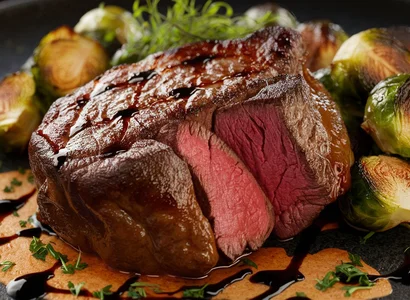
Day 4
Breakfast:
- Keto Pancakes: Make pancakes with cream cheese, eggs, vanilla, and almond flour. Serve with sugar-free syrup. (2 oz cream cheese, 2 eggs, 1 tsp vanilla, 1 tbsp almond flour, 1 tbsp butter, 2 tbsp sugar-free syrup)
Lunch:
- Chicken and Bacon Lettuce Wraps: Wrap grilled chicken, bacon, avocado, and mayo in large lettuce leaves. (4 oz chicken breast, 2 slices bacon, 1/4 avocado, 1 tbsp mayonnaise, lettuce leaves)
Dinner:
- Grilled Steak with Brussels Sprouts: Grill a beef steak and serve with roasted Brussels sprouts and herb butter. (5 oz beef steak, 1 cup Brussels sprouts, 1 tbsp olive oil, 1 tbsp herb butter)
- One-Pan Summer Vegetable Ragú: Cook assorted summer vegetables with olive oil and garlic. (2 cups mixed summer vegetables, 2 tbsp olive oil, 1 tsp garlic powder, salt, pepper)
Snack:
- Nuts and Cheese: Enjoy pecans with string cheese. (1 oz pecans, 1 string cheese)
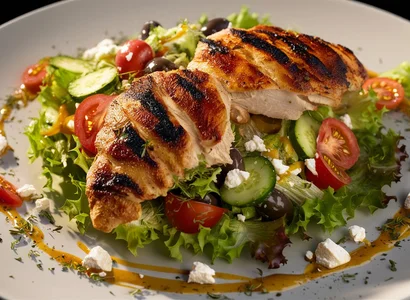
Day 5
Breakfast:
- Keto Breakfast Bowl: Combine scrambled eggs, crumbled sausage, avocado, cheddar cheese, and sour cream. (2 eggs, 1 oz sausage, 1/4 avocado, 1 oz cheddar cheese, 1 tbsp sour cream)
Lunch:
- Greek Salad with Chicken: Top mixed greens with grilled chicken, feta cheese, olives, cucumber, and olive oil dressing. (3 cups mixed greens, 3 oz chicken breast, 1 oz feta cheese, 5 kalamata olives, 1/4 cup cucumber, 2 tbsp olive oil dressing)
Dinner:
- Baked Cod with Cauliflower: Bake cod with butter and herbs, serve with roasted cauliflower and tartar sauce. (5 oz cod, 1 tbsp butter, 1 cup cauliflower, 1 tbsp olive oil, 2 tbsp tartar sauce)
- Sheet-Pan Garlicky Shrimp & Veggies: Roast shrimp and vegetables with garlic and olive oil. (8 oz shrimp, 1 cup mixed vegetables, 2 tbsp olive oil, 1 tsp garlic powder, salt, pepper)
Snack:
- Nuts and Salami: Enjoy Brazil nuts with salami slices. (1 oz Brazil nuts, 1 oz salami)
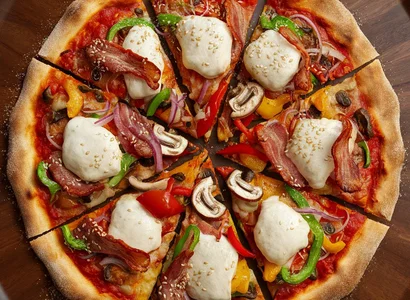
Day 6
Breakfast:
- Keto Coffee with Eggs: Blend coffee with MCT oil and butter, serve with hard-boiled eggs. (1 cup coffee, 1 tbsp MCT oil, 1 tbsp butter, 2 eggs)
Lunch:
- Keto Pizza: Top a low-carb tortilla with tomato sauce, mozzarella, and pepperoni. (1 low-carb tortilla, 2 tbsp tomato sauce, 2 oz mozzarella, 2 oz pepperoni, 1 tbsp olive oil)
- Spinach and Feta Stuffed Chicken: Stuff chicken breasts with spinach and feta and bake. (2 chicken breasts, 1 cup spinach, 1/2 cup feta, salt, pepper)
Dinner:
- Baked Chicken Thighs with Spinach: Bake chicken thighs and serve with sautéed spinach and Alfredo sauce. (5 oz chicken thighs, 1 cup spinach, 1 tbsp olive oil, 2 tbsp Alfredo sauce)
- Zucchini Lasagna Roll-Ups: Spread ricotta on zucchini strips, roll, and bake with marinara and mozzarella. (3 zucchinis, 1 cup ricotta, 1 egg, 1 cup marinara sauce, 1 cup mozzarella, salt, pepper)
Snack:
- Seeds and Cream Cheese: Enjoy pumpkin seeds with cream cheese. (1 oz pumpkin seeds, 1 oz cream cheese)
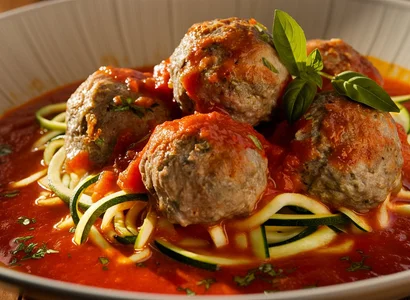
Day 7
Breakfast:
- Pizza Frittata: Mix eggs, pepperoni, cheese, and bake. (6 eggs, 1/4 cup heavy cream, 1/2 cup pepperoni, 1 cup mozzarella, salt, pepper)
Lunch:
- Keto Chicken Soup: Combine shredded chicken, broth, heavy cream, and low-carb vegetables. (4 oz chicken, 1 cup broth, 1/4 cup heavy cream, 1/2 cup mixed vegetables, 1 tbsp butter)
- Grilled Salmon with Asparagus: Season salmon and asparagus, grill until cooked. (8 oz salmon, 1 cup asparagus, 2 tbsp olive oil, salt, pepper)
Dinner:
- Turkey Meatballs with Zucchini Noodles: Serve turkey meatballs in tomato sauce over zucchini noodles with Parmesan. (5 oz ground turkey, 2 tbsp tomato sauce, 1 cup zucchini noodles, 1 tbsp olive oil, 1 oz Parmesan)
- Caprese Chicken Stuffed Peppers: Mix chicken with tomatoes, mozzarella, and pesto and stuff into peppers. (4 bell peppers, 2 cups shredded chicken, 1 cup cherry tomatoes, 1/2 cup fresh mozzarella, 2 tbsp pesto, salt, pepper)
Snack:
- Nuts and Cheese: Enjoy walnuts with brie cheese. (1 oz walnuts, 1 oz brie cheese)
Keto Food List
Here’s a complete list of keto foods to include in your keto diet meal plan:
Proteins:
- Fish and seafood (salmon, sardines, mackerel, tuna)
- Poultry (chicken, turkey)
- Eggs
- Beef
- Pork
- Lamb
- Organ meats
Low-Carb Vegetables:
- Leafy greens (spinach, kale, lettuce)
- Broccoli
- Cauliflower
- Zucchini
- Bell peppers
- Asparagus
- Celery
- Green beans
- Eggplant
Dairy:
- Cheese (cheddar, feta, blue cheese, mozzarella, cream cheese)
- Plain Greek yogurt (full-fat)
- Cottage cheese (full-fat)
- Heavy cream
- Butter
Nuts and Seeds:
- Almonds
- Walnuts
- Macadamia nuts
- Pecans
- Flaxseeds
- Chia seeds
- Pumpkin seeds
- Sunflower seeds
Healthy Fats:
- Avocados
- Olive oil
- Coconut oil
- MCT oil
- Avocado oil
Berries (in moderation):
- Blackberries
- Raspberries
- Strawberries
- Blueberries
Beverages:
- Water
- Unsweetened coffee
- Unsweetened tea
- Bone broth
- Unsweetened almond milk
Condiments and Seasonings:
- Salt
- Pepper
- Herbs and spices
- Lemon juice
- Mayonnaise (sugar-free)
- Mustard (sugar-free)
- Hot sauce (sugar-free)
Natural Sweeteners (in moderation):
- Stevia
- Erythritol
- Allulose
- Monk fruit sweetener
Foods to Avoid on the Ketogenic Diet
Here’s a comprehensive list of foods to avoid on the ketogenic diet:
Grains and Grain Products:
- Wheat (bread, pasta, cereals)
- Rice (white, brown, wild)
- Oats and oatmeal
- Corn and corn-based products
- Barley
- Rye
- Quinoa
- Millet
- Bulgur
- Amaranth
Starchy Vegetables:
- Potatoes (all varieties)
- Sweet potatoes
- Yams
- Corn
- Peas
- Carrots (in large amounts)
- Parsnips
- Beets
Legumes:
- All types of beans (kidney, pinto, black, etc.)
- Lentils
- Chickpeas
- Soybeans and soy products
High-Sugar Fruits:
- Bananas
- Apples
- Oranges
- Grapes
- Pineapple
- Mango
- Pears
- Fruit juices
Sugars and Sweeteners:
- White sugar
- Brown sugar
- Honey
- Maple syrup
- Agave nectar
- High fructose corn syrup
Most Processed Foods:
- Chips
- Crackers
- Cookies
- Cakes
- Pastries
- Ice cream
- Candy
Sweetened Beverages:
- Soda
- Fruit juices
- Sports drinks
- Sweetened teas and coffees
- Energy drinks
Alcoholic Beverages:
- Beer
- Sweet wines
- Cocktails with sugary mixers
- Flavored alcohols
Certain Condiments and Sauces:
- Ketchup
- BBQ sauce
- Sweet salad dressings
- Teriyaki sauce
- Many store-bought sauces and marinades
Most Milk and Dairy Products:
- Regular milk
- Flavored yogurts
- Ice cream
- Sweetened coffee creamers
Vegetable Oils:
- Canola oil
- Soybean oil
- Corn oil
- Grapeseed oil
Certain “Healthy” Foods:
- Granola
- Trail mix (with dried fruits and chocolate)
- Protein bars (many contain added sugars)
- Smoothies (unless homemade with keto-friendly ingredients)
Benefits of the Keto Diet
- Weight Loss: The keto diet can lead to short-term weight loss, especially in the first 6-12 months
- Improved Mental Focus: Unlike glucose, which can cause spikes and crashes in blood sugar levels, ketones offer a more consistent and efficient fuel source that can enhance cognitive functions.
- Increased Energy Levels: When your body adapts to using fat as its primary energy source, you avoid the energy dips associated with carbohydrate consumption.
- Better Blood Sugar Control: The keto diet can help manage and prevent type 2 diabetes.
- Improved Cardiovascular Health: Some studies show the keto diet has positive effects on body weight, BMI, abdominal circumference, HDL cholesterol, triglycerides, glycemia, HbA1c, and insulin.
Potential Risks of the Keto Diet
- Increased LDL Cholesterol: Some studies show a significant increase in LDL-C levels, which may increase cardiovascular disease risk.
- “Keto Flu“: Some people experience symptoms like fatigue, headache, dizziness, nausea, and constipation when starting the diet.
- Kidney Stress: Patients with kidney disease may have an increased risk of requiring dialysis due to the additional ketones their renal system has to process.
- Dehydration: Some people may experience dehydration due to the loss of glycogen, which holds water in the body.
Tips for a Successful Keto Diet Plan
- Plan Your Meals: Prepare a weekly meal plan to ensure you have all the ingredients you need and avoid last-minute temptations. This helps you stay on track and makes grocery shopping easier.
- Stay Hydrated: Drink at least 8-10 glasses of water daily. You can also include herbal teas and bone broth. Staying hydrated helps with digestion and can reduce the risk of keto flu.
- Monitor Your Macros: Keep track of your macronutrient intake to ensure you’re getting the right balance of fats, proteins, and carbs. Use apps or food journals to help you stay within your target ranges.
- Incorporate Healthy Fats: Focus on consuming healthy fats such as avocados, olive oil, coconut oil, and nuts. These fats provide essential nutrients and help keep you feeling full and satisfied.
- Avoid Hidden Carbs: Read labels carefully to avoid foods with hidden sugars and carbs. Be cautious of processed foods and opt for whole, unprocessed foods whenever possible.
- Electrolyte Balance: Ensure you’re getting enough sodium, potassium, and magnesium. These electrolytes are crucial for maintaining energy levels and preventing muscle cramps. Consider adding supplements or eating electrolyte-rich foods like leafy greens and nuts.
- Gradual Transition: If you’re new to the keto diet, consider gradually reducing your carb intake instead of going cold turkey. This can help minimize the symptoms of keto flu and make the transition smoother.
- Stay Active: Regular exercise can help you achieve your weight loss goals and improve overall health. Aim for a mix of cardio, strength training, and flexibility exercises.
- Listen to Your Body: Pay attention to how your body responds to the diet and make adjustments as needed. Everyone’s body is different, and what works for one person might not work for another.
Conclusion
Embarking on a ketogenic diet can be a transformative experience, offering numerous health benefits and an effective way to lose weight.
This 7-day keto diet plan for beginners provides a structured approach, making it easier to transition into a ketogenic lifestyle.
By following this keto diet meal plan and incorporating the provided keto recipes, you’ll be well on your way to achieving your health and fitness goals.
Remember, consistency is key, and with the right mindset and preparation, you can successfully navigate your keto diet journey.
- Gastric bypass diet plan
- Dukan diet: Attack phase recipes
- BRAT diet: Foods to eat and avoid
- 7-day lion diet meal plan
- 14-day Atkins diet plan
- 7-day Ozempic diet plan
- 14-day zero-carb diet plan
- 7-day animal-based diet plan
- 7-day vegetarian meal plan
- 7-day vegan meal plan
- Simple Blue Zone recipes
- Thyroid diet plan for Hashimoto’s disease
FAQs
What are the basic rules for keto?
The basic rules for keto include drastically reducing carbohydrate intake, typically to less than 50 grams per day, increasing fat intake to make up about 70-75% of your total calories, and consuming moderate amounts of protein.
What are the top 10 keto foods?
The top 10 keto foods are avocados, eggs, cheese, fatty fish (like salmon), meat (like beef and pork), nuts and seeds, olive oil, coconut oil, butter and cream, and low-carb vegetables (like spinach and kale).
What is the best meat for keto?
The best meat for keto includes fatty cuts of beef (like ribeye and ground beef), pork (like bacon and pork chops), lamb, and fatty poultry (like chicken thighs and duck). These meats are high in fat and protein, which are essential for a ketogenic diet.
Can you eat rice on keto?
No, you cannot eat rice on keto as it is high in carbohydrates. One cup of cooked white rice contains around 45 grams of carbs, which can quickly exceed your daily carb limit on a keto diet.
Which fruit is keto-friendly?
Berries such as strawberries, raspberries, blackberries, and blueberries are keto-friendly in moderation. They are lower in carbs compared to other fruits and can be enjoyed in small quantities.
Can you drink milk on keto?
It’s best to avoid regular cow’s milk on keto due to its high carbohydrate content. Instead, opt for unsweetened almond milk, coconut milk, or other low-carb milk alternatives.
Is Chicken keto-friendly?
Yes, chicken is keto-friendly. Opt for fattier cuts like thighs and drumsticks over leaner cuts like breasts to increase your fat intake. Chicken is a versatile protein source that fits well into a keto diet.
Disclaimer: The keto diet may not be suitable for everyone. Consult with a healthcare provider or registered dietitian before starting the keto diet to ensure it aligns with your individual health needs and goals. This information is for general purposes only and is not intended as medical advice.
